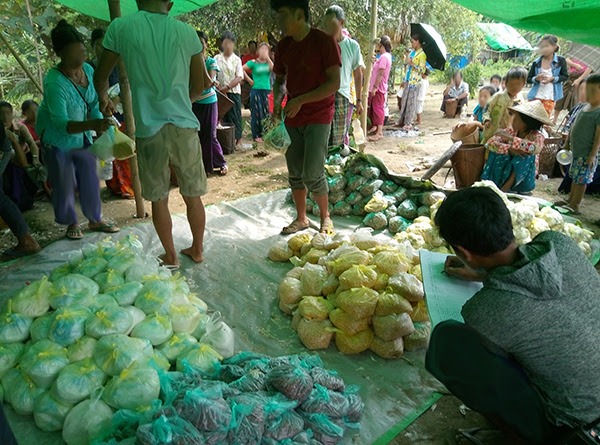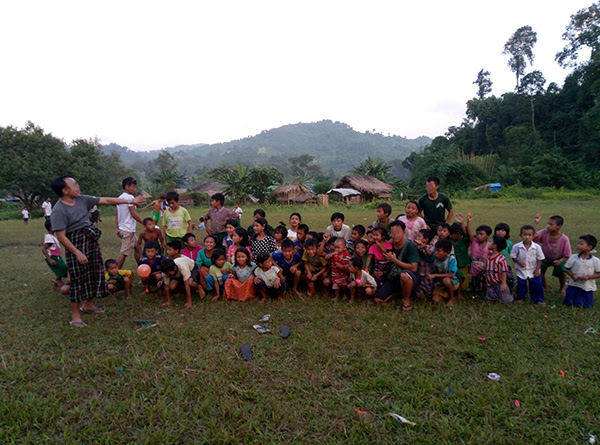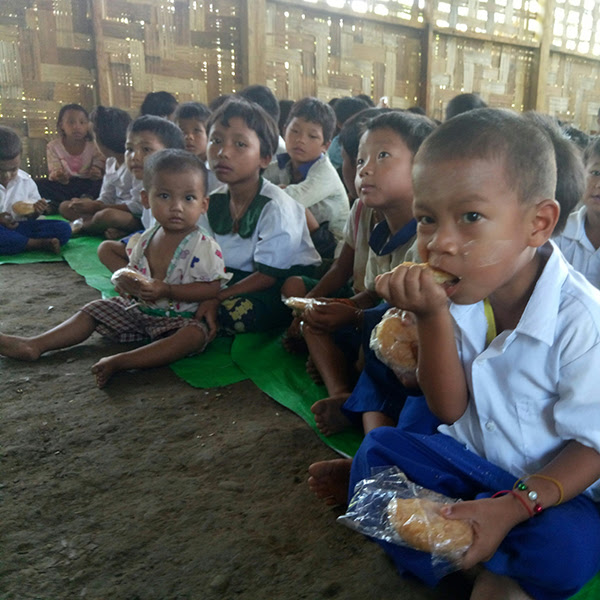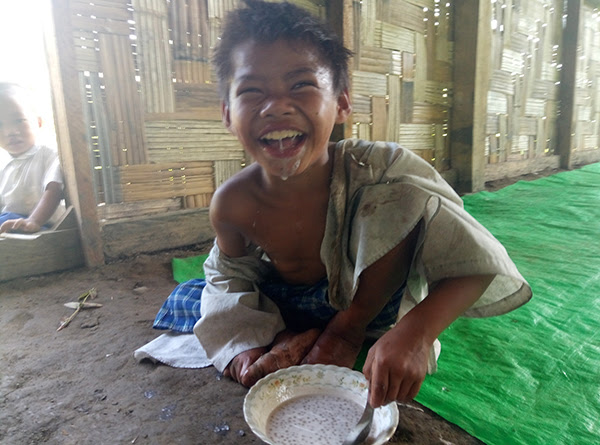Rangers Help Vulnerable Civilians in Kachin State
The Kachin of northern Burma are beleaguered, desperately in need of aid and vulnerable to attack. The Burma Army has conducted military offensives against civilian populations and forced more than 100,000 Kachin to flee since 2011, becoming internally displaced people (IDPs) in their historic lands. The displaced reside in camps and the jungle in various levels of deprivation, fearful of the army’s return.
They call out for help, and during FBR’s September 2018 humanitarian relief mission the villagers all said the same thing: “We don’t want to run. We need peace in our Kachin land.”
Lawa, the FBR team leader, coordinated with state government officials and camp leaders to locate vulnerable IDPs that the team could impact the most. Several camps were identified in the Sumprabum Township jungle in northern Kachin State, where over 900 IDPs struggle to access basic goods as they are located far from supplies, medical care and Kachin State government assistance, yet within Burma Army-controlled territory and the military’s reach.
“I never thought to do a mission in Burma Army-controlled area before, but I had dreamed a lot to do a mission there. Why? This is our Kachin peoples. We need to help and take care of them,” Lawa said.
The Ranger team came from various quarters of Kachin State to rendezvous and prepare for the mission. Six Rangers and a guide journeyed to the IDP camps over a three-day period, first in overladen vehicles on Kachin State unimproved roads that wind through mountainous terrain, then by boat and raft, an upriver struggle that occasionally required the Rangers to hike river sections not navigable by boat.
With all their supplies for the IDPs, they had to pass by Burma Army posts, with soldiers that questioned their passage and reasons for carrying so many supplies. To protect their mission, the Rangers claimed to be freelance miners, as Kachin State is rich in jade, amber and gold and mining is a common occupation.
“We say thank God! Nobody was arrested,” Lawa said. “Very difficult mission to carry supplies to these Kachin IDPs.”
Away from the soldiers’ scrutiny, the Rangers grunted their way up steep jungle hills, eager to reach the IDP camps. Once they arrived, the villagers shared the story of their oppression and how they remain vulnerable.
In June 2015 the Kachin Independence Organization (KIO) and Kachin Independence Army (KIA) leaders sent word to Sama Mountain villagers and neighboring villages in Sumprabum Township that hostilities between the Burma Army and KIA were approaching. “We were told we needed to prepare to find somewhere to hide,” one farmer named Lu Bu, aged 53 and born in Sama, said when interviewed by the Rangers. She recounted how they first fled to a neighboring village for two days before being told to flee further away to Ndup Yang IDP Camp. “The war between the Burma Army and KIA was becoming too hot,” she said.
A young teacher named Ban Nu, aged 22, who fled from the 2015 Burma Army advance, described the difficulty of trying to educate children within the conflict zone. “I don’t remember how many times we are running here and there. It was hard to teach the students because of no proper facilities, and the situation was very uncertain even when we stayed in IDP camps,” she said. “Stop the war in our Kachin land!”
Since 2015, the IDP camps and villagers remain impacted by the Burma Army presence. Approximately three kilometers down river from the camps and villages, the Burma Army Light Infantry Battalion (LIB) 138 has a base, and their proximity to the villages is intended to prevent villagers from supporting Kachin resistance groups. Here, the Burma Army is an occupier and military authority, and in January and May 2018 fighting engulfed the villagers’ lives again.
The children of these mountains, whose families are supported by subsistence farms and who are educated in small village schools, learned about the fighting firsthand. Tu Lum, a 13-year-old boy, was sitting in class in January 2018 when the first gunshots were heard and explosions tore through the silence of the valleys. “What’s going on?” he fearfully asked his teacher. “Everyone was shocked and scared,” Tu Lum recounted.
The teachers decided to send the students home to be with their families, so Tu Lum hurriedly ran home. He arrived and found no one, as his parents were tending their paddy fields outside of the village. Discerning the danger, Tu Lum packed supplies for when it came time to flee, and then he waited in front of his home, alone, for his parent’s return.
After an hour of waiting, Tu Lum’s parents returned from their paddy field. They grabbed their boy and the supplies he had packed and hurriedly ran from their village and hid in their fields. They stayed in the paddy fields for three weeks, listening as the fighting would subside and escalate. The fighting moved closer to their paddy, so the family made their way to Salang Yang IDP Camp, where they remain. Other villagers stayed in the jungle for two months, not even able to light fires out of fear that the light and smoke would attract Burma Army soldiers.
January’s attacks were consistent with previous battles between the Burma Army and KIA. In May 2018, the Burma Army would target civilians.
Life in Bawmwang Village began early, at six or seven. After breakfast villagers would go to their fields and begin their work-day. On 12 May 2018, Zung Dai, a father of six, left two of his children at home as he departed to tend his paddy. The other four children were away with his wife. On the way, he heard the thundering of jets soaring past his village, something he heard about once a year.
As he walked, he heard the jets circle back around and deafening explosions came from the village. Panicked about his children, Zung Dai rushed home to find them screaming, terrified. He ran inside and gathered them into his arms. The bombs continued to fall. “What should I do?” he wondered. He could stay in his village and home that were being targeted, or flee – but without preparation and without his wife and other four children. He decided he had to get the two children with him to safety immediately. He was worried about running back into the village, so, taking one child in his arms and swinging the other onto his back, he kicked out the bamboo wall at the back of his home and fled into the jungle behind his house.
His children cried with fear as they hid. “Okay, don’t cry,” he said. “Father is with you.” Zung Dai held his children in the jungle for ten minutes, while the jets circled the village and released eight bombs, all of which fell inside the Kachin Baptist Church Missionary School property. “In the hiding place I looked out and saw black smoke in the village,” he said. He emerged to see what the damage was. “Nobody was injured or died, only our village headmaster’s house was hit by bomb shrapnel,” Zung Dai said. “Please tell the world what has happened to our village, so that we can get freedom and peace.”


The uncertainty of when an attack will come and if the villagers will need to flee again weighs on the hearts of the displaced in these camps. The Good Life Club program the Rangers conducted helped to lift the spirits of these displaced people, if only for a couple of days, to give them hope. The Rangers sang and danced with the villagers at both camps, told stories with biblical themes and lessons, and shared their joy in being able to give all of the supplies they had brought with them to their people. They also provided medical care for patients who needed it.
Ndup Yang IDP Camp manages 110 households of 627 people, and Salang Yang IDP Camp supports 64 households and 307 people, totaling 934 IDPs.

The Rangers distributed:
- Rice (70) bags weighting 50kg each = 3500kg
- Garlic (10) bags weighing 32kg each = 320kg.
- Ground nuts (2) bags weighing 80kg each = 160kg.
- Dry fish (2) bags.
- Salt (10) bags weighing 40kg each = 400kg.
- Cooking oil 50 liters.
- Fermented fish sauce (200) tin cans.
- Indian beans/dal (3) bags weighting 80kg each = 240kg.
- Some useful materials for the children.
Village leaders said the main struggle encountered daily is difficulty in cultivating their farms freely. Burma Army patrols move regularly through their area. It is also difficult to manage their children because of the unstable situation. IDP camps struggle to have resources for education and well-trained teachers. Lastly, their earnings are insufficient. In one day, a male may earn 10,000 kyats and a female may earn 6,000 kyats ($6.30 and $3.78 USD, respectively) for labor-intensive work.
Medical Treatment:
The team medics were able to treat more than 100 patients who came to them with various ailments. The majority of the conditions were related to poor nutrition and lack of shelter – things such as anemia, general weakness, body aches, coughs and fevers. About 25% of the patients were children, mostly from one camp. Many of their symptoms were indicative of respiratory ailments which can be quite contagious and to which children are particularly vulnerable. This is concerning, as the isolation of the camps makes it difficult to respond quickly to any kind of disease outbreak.

Good Life Club Programs
The first GLC program, at Ndup Yang camp, had approximately 200 children. At the Salang Yang IDP Camp about 100 children participated. IDPs praised the material and spiritual relief that the team brought. “We worry about our life and our future! You give us hope,” an IDP man said. “Please come every year to give us help.”
Another IDP woman said, “Thank you for providing food and medical treatment and also taking care of our children.”
Lawa, the mission team leader, saw the benefit of the mission for developing his Rangers. “This mission is good to do,” he said. “We can’t buy all the help for the different ethnic people in Burma, but I have a duty to try.”
Lawa’s final mission conclusion was, “The IDP peoples really appreciate our FBR team and were very…very thankful, they also mention that God open the way for them to meet FBR team, this is the special blessing from our almighty God. Thank you so much…for everything and we are always welcome to come back again, that’s their hope and prayer.”
Thanks for praying for us and God bless you,
Kachin Free Burma Rangers


View this original report HERE.

